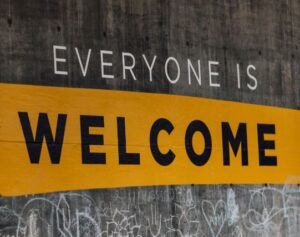Immigrant Rights

The same is true today as ever: people move to make a better life for their families. Immigrant Americans move here for the promise of freedoms that all of us cherish, native or newcomer. Immigrants are our neighbors, friends, and family – they make up our communities, help bolster our economy, and contribute to our shared culture. Immigrants, like all of us, often need help finding safe, stable, and healthy housing, among other public services. Everyone, no matter where they come from or how long they’ve lived here, deserves a safe and affordable place to call home. The United States must be a beacon for all people who seek a better life for themselves and their families.
Immigrant Access to Housing and Emergency Assistance
Mixed-Status Rule
For federal housing programs subject to Section 214 of the Housing and Community Development Act, Congress has authorized that “mixed-status” families, those which include members who are eligible and others who are ineligible for housing assistance based on their immigration status, to be permitted to live together in subsidized housing with prorated assistance.
For more information, see NHLP and the National Low-Income Housing Coalition’s Keeping Families Together campaign.
Resources:
Public Charge Rule
Some people who apply for a green card (Lawful Permanent Resident status) or a visa to enter the U.S. must pass a “public charge” test, which looks at whether they are likely to depend primarily on the government for support in the future. Immigration officials look at a person’s whole situation, including their age, income, health, education or skills, and family situation. This includes whether a family member or another person with enough income or resources has promised to support someone.
Currently, under the public charge rule, only two kinds of public benefits are considered in the public charge test:
- Cash assistance programs that provide on-going payments. Examples include “SSI,” “TANF,” and “General Assistance.”
- Long-term institutional care, like a nursing home, at government expense.
Public benefits that do NOT count towards a public charge determination: Federal housing assistance, shelters, homeless services, disaster relief, homeownership assistance, SNAP, TANF/Welfare payments, CHIP, Medicaid and other health care (except long-term institutional care), free or reduced school lunches, food banks or free meals, earned income and child tax credits, and loans.
The current public charge regulations can be found here. For more information on public charge and immigrant access to public benefits, check out the Protecting Immigrant Families campaign.
Public Charge Legal Challenges
Updated: January 10, 2023
Trump-Era Public Charge Lawsuit Comes to a Close
Supreme Court Shuts Down Attempts to Revive Cruel Public Charge Rule but the Legal Fight Continues
On January 9, 2023, the Supreme Court declined to review whether Texas and other states can reopen litigation challenging the Trump administration’s 2019 public charge rule. The 2019 rule punished people seeking permanent resident status in the United States if they use—or are deemed likely to use in the future—public supports to meet their family’s basic health, housing and nutrition needs.
Read the press release from the Illinois Coalition for Immigrant and Refugee Rights, Shriver Center on Poverty Law, Legal Council for Health Justice, and National Housing Law Project.
Updated: March 9, 2021
Public Charge Legal Fight Ends: Victory for Immigrant Communities Nationwide as U.S. Justice Department Drops Defense in Public Charge Case
The ongoing public charge litigation battle ended and the Trump rule can no longer be enforced. On March 8, 2021, the United States Department of Justice filed motions to dismiss its defense of the Trump public charge rule, ending a nearly two-year legal battle and invalidating the rule nationwide. The public charge rule has effectively denied millions of immigrant families health care and economic support–a particularly cruel impact during the COVID-19 pandemic.
Read the press release from the Illinois Coalition for Immigrant and Refugee Rights, Shriver Center on Poverty Law, Legal Council for Health Justice, and National Housing Law Project.
Information on Public Charge Before 2021:
Language Access
Additional Resources
- NHLP has prepared this memorandum which provides additional legal guidance for advocates seeking remote hearings as a means of trying to protect their clients against possible ICE encounters. (August 2025)
- The National Tenants Bill of Rights
- Saving Affordable Homes
- Housing Voucher Utilization
- Protections for Survivors of Gender-Based Violence
- Nuisance and Crime-Free Ordinances Initiative
- Immigrant Rights
- Fair Housing & Housing for People with Disabilities
- Housing Opportunities for People Reentering
- Healthy Housing
- Tenants and Foreclosure
- Utility Allowances, Energy-Efficiency, and Renewables in Affordable Housing
